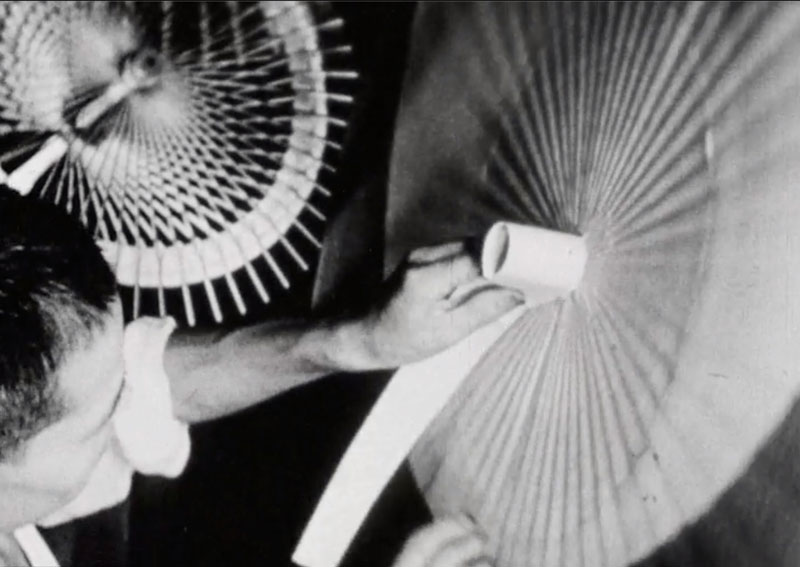
© Mingei Film Archive Project/Matry Gross Film Productions Inc.
Japanese Paper Craft in the 1930s:Short Films from the Mingei Film Archive
- 24 July 2024
- 18:30 - 19:30
- The Hall, Japan House London, 101-111 Kensington High Street, London, W8 5SA
- https://www.japanhouselondon.uk/whats-on/japanese-paper-craft-in-the-1930sshort-films-from-the-mingei-film-archive/
- +44 (0)20 7932 7100
- info@japanhouselondon.uk
- Tweet
Following the event on 17 July exploring the Mingei Movement in collaboration with William Morris Gallery, join us at Japan House London for a screening of three short films that provide rare insight into Japan’s rich craft traditions in the late 1930s and the enduring legacy of Mingei.
The Mingei Movement, founded in the late 1920s by Yanagi Sōetsu, sought to celebrate the beauty of ordinary, handcrafted objects made by local craftspeople. Rooted in the appreciation of Japanese folk art, the movement aimed to preserve and promote techniques and aesthetics that were being overshadowed by industrialization. Mingei (‘Folk Craft’) emphasizes functionality, simplicity, and natural beauty, valuing the skill and spirit of the makers.
In 1974, while researching for his film ‘Potters at Work’, Canadian filmmaker Marty Gross stumbled upon a significant collection of films documenting Japanese rural life and crafts. Inspired by a passage in Bernard Leach’s ‘A Potter in Japan’, Gross reached out to Leach’s wife Janet Darnell Leach, who confirmed the existence of these historical films, including films made in 1934-35 by Bernard Leach himself. Despite their fragile and imperfect condition, Gross undertook the meticulous task of restoring these 16mm films. His efforts over the years to preserve many hours of precious footage of Japanese craft traditions formed the basis of his Mingei Film Archive project.
The films being screened at Japan House London focus on three different aspects of paper and paper crafts in the late 1930s, with the following schedule:
Japanese Paper, 1938 (22 minutes)
This film, shot in Mino City, Gifu Prefecture, follows the intricate process of Japanese papermaking. Originally a silent film, in a newly created commentary paper maker Sawamura Masashi explains the various stages involved in making paper by hand and provides insights into the lives of the craftspeople.
The Japanese Paper Umbrella, 1938 (21 minutes)
Filmed in Gifu City, which was a major centre of umbrella production at that time, this documentary explores the production of Japanese paper umbrellas. Umbrella dealer and restorer Sakaida Eiji, an expert in the craft, describes the meticulous steps taken to construct and assemble these beautiful, functional items.
The Japanese Paper Lantern, 1938 (22 minutes)
With a commentary by historian Ōtsuka Kiyoshi, this film focuses on the production of Japanese paper lanterns, primarily made by the Ozeki Lantern Company, which has been producing them since the Meiji Period (1868-1912). Ōtsuka Kiyoshi, who is also Director of the Gifu City Historical Museum, describes the creation process and significance of these lanterns in the lives of Japanese people.
These are restored silent films with a voice-over commentary in Japanese with English subtitles.
Additionally, between 17 and 24 July, two more silent, short films from the Mingei Film Archive will be available for viewing in the Library on the Lower Ground Floor at Japan House London: “Bernard Leach Films the Making of Kokeshi Dolls”, 1934 (4 minutes) and “Bernard Leach Films the Making of Tiles for the Game of Shogi”, 1934 (3 minutes).
About the Mingei Film Archive
Producer Marty Gross is a Canadian consulting producer for companies based in North America, Europe and Asia, with focus on Japanese art, film, theatre and crafts. His company, Marty Gross Film Productions, Inc. (founded in 1975), manages one of the most comprehensive websites devoted to films on Japanese cultural and historical subjects. Since 1974, he has produced and directed films (including As We Are, Potters at Work, The Lovers’ Exile), restored archival films on Japanese arts and crafts (such as The Leach Pottery, Maskiko Village Pottery, Japan 1937), conducted numerous interviews, produced documentaries and coordinated publication of books on the history of Japanese cinema.
The Mingei Film Archive is an ongoing project by Marty Gross to locate, restore and enhance films on the history of craftsmanship. The Archive now consists of over 60 films from 1925 to 1976, on pottery making, paper, woodcraft and textiles in Japan, Korea, the United Kingdom and the US. Many of the films were in delicate and fragile condition and required extensive repair and preservation efforts before digitization. All the films are being enhanced with new audio commentaries, edited from recordings made with craftspeople around the world.
Please note that filming and photography may take place at this event. Photos and footage of the event may then be used to promote Japan House London, helping more people to discover what we offer. If you have any concerns, please contact us online or contact a member of the team on site.
Booking Essential | Admission Free
